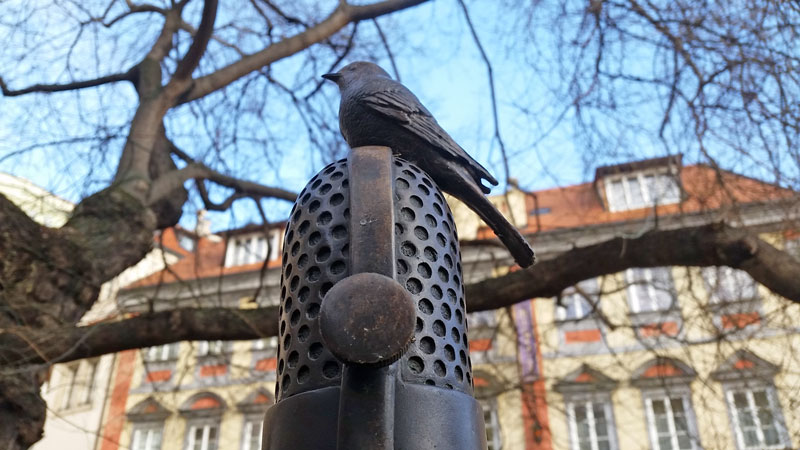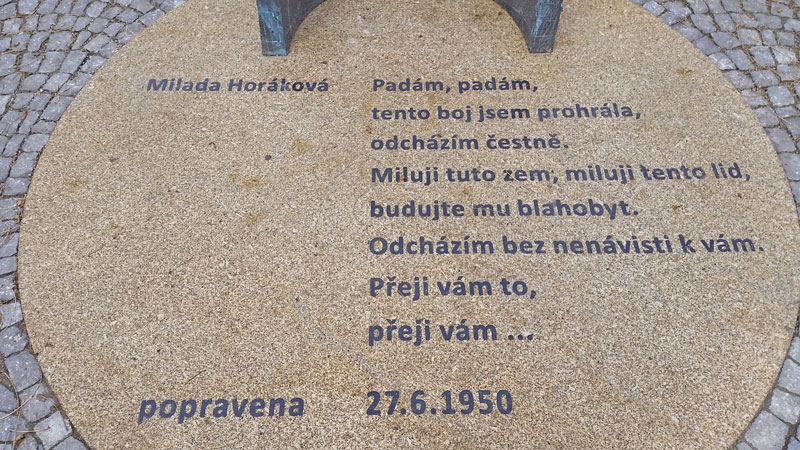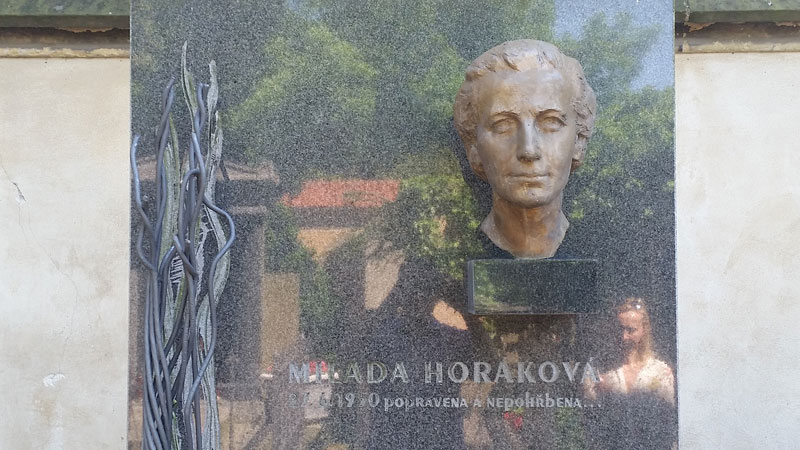Milada Horakova
The story of a brave and honest woman who chose to fight.
Born on Christmas Day 1901 in what was then called Royal Vinohrady, Milada Horakova was an active demonstrator against the Austro-Hungarians in the first world war. So much so that she was initially banned from her Grammar school but later completed her studies in Medicine and later graduated from Charles University with a degree in Law.

The Memorial
The Milada Horakova memorial is a bird perched on an old style microphone. The microphone is a copy of that used in the 1950s trials of many Czech intellectuals who opposed communist rule. There’s also a plaque underneath and it reads:

I am falling and this fight I lost. I leave with honesty. I love this country. I love these people. Bless them. I will leave without seeing you. I’m sorry it must be.
Milada Horakova – learning she had been sentenced to death
In 1924 she became politically active by joining the Womens National Council and later in 1929 joining the Czech National Socialist party where she worked on Equal Rights for women, Social Justice and Social Care. Around this time she started to travel. She was able to get by in German and English and also spent time in Russia. Now under full control of the Bolsheviks she saw how their political doctrine was enforced and applied to the common man.
Shortly after the outbreak of the second world was she was arrested for having links to the Czech resistance and was imprisoned for two years before being sent to Terezin as a political prisoner. In 1944 she was transferred to Dresden where she was put on trial and eventually sentenced to death. However the sentence was commuted to 8 years hard labour of which less than a year was served before liberation by US armed forces in April 1945.
Post 1945 she became a senior figure in the Czech Socialist party under President Edvard Beneš and was elected to the National Assembly in 1946 which was a coalition government with the Communist National Front under Klement Gottwald. This confirmed Milada Horakova’s view that the government was becoming subservient to Communist ideals and rejecting assistance from the west.
In early 1948 with the Communists looking like they will lose their place in the coalition government, Klement Gottwald (primeminister) set about infiltrating the security services with communist sympathisers and on February 21st most of the government resigned in protest hoping to force an early election. Gottwald merely replaced the open positions with his own people and effectively a Coup D’Etat was completed.
Shortly after the 1948 Communist Coup D’Etat, Milada Horakova was expelled from government and although she could have gone into exile like many others, she chose to remain in Czech and set up an informal political group with some of these exiles. The Communist run StB (security service) arrested Milada Horakova on September 22nd 1949.
Milada Horakova became a “Central” figure in the Communists desire to crush all political resistance. Alleged to have been part of a conspiracy to overthrow the new government she was charged with treason and tortured both physically and psychologically. From November 1949 the purge of the political opponents began with the execution of five former members of the Czech Socialist party and this was seen as the build up to the public trial of Milada Horakova in May 1950. The “trial” such as it was for her and 12 colleagues lasted from May 31st to June 8th.
Milada Horakova chose to defend her beliefs and ideals rather than a false confession knowing that her fate could be death in any case. Sentenced to death by hanging, her daughter and lawyer both requested clemency. In fact Eleanor Roosevelt, Winston Churchill and Albert Einstein all requested clemency but in vain and Milada Horakova was hung on June 27th 1950.

Executed an Unburied
There is a gravestone at the famous Vysehrad cemetery but it does not mark where she is buried. In Czech it reads Popravena a Nepohrbena which means “Executed and Unburied”. After hanging, the body was cremated and the urn kept at the Pankrac prison with hundreds of others. Later these urns were taken to a variety of cemeteries so the location of her final resting place is currently unknown.